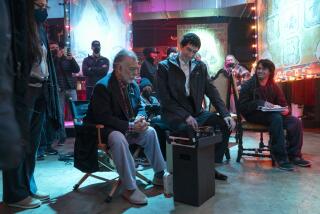Sony’s Fake Movie Critic and Ad Blurb: It’s Amazing!
- Share via
While everyone is suddenly getting bent out of shape because Sony’s ad department created a rave movie review by a nonexistent critic, let’s remember that this kind of thing has been going on for years (“Sony Says It Will Take Action Over Fake Critic,” by Robert W. Welkos, June 5).
In one Times article, DreamWorks’ marketing head Terry Press admitted that “if they didn’t say it exactly the way you want, you just take the part of what they said that you do want . . . and if they don’t say what you want, you just make it up yourself anyway.” This is like putting scenes in the trailer that aren’t in the movie. What will happen if this “cry wolf” practice continues? The public may eventually get wise and refuse to believe any ad claims at all.
An internal inquiry by Sony is hardly enough. This kind of tactic is misrepresentation in advertising, pure and simple. It should be stopped by Sony and industrywide for the good of all studios, advertisers and the public.
WARREN GARFIELD
Studio City
*
Why all the fuss over Sony’s imaginary film critic? I’m a firm believer in the following principle: Any studio flick produced from any script directed by any human being will earn at least three good reviews from somebody, somewhere, the highlights of which will appear in full-page ads. This is more a function of mathematics than movie magic, there being a whole bunch of film critics out there (see “monkeys,” “infinite” and “Hamlet” for verification).
I believe I speak with some authority on the matter, as the writer-director of the epic “Attack of the Killer Tomatoes” and its sequels. In fact, “Killer Tomatoes Eat France,” Part 4 of the Tomatoes Trilogy, has earned three stars from more than one reviewer . . . an especially noteworthy accomplishment given the fact that every “Tomatoes” flick begins “two stars in the hole” based on its title alone.
As a public service, let me share my foolproof system for separating the wheat from the crap. Er, chaff. When perusing a movie ad, ignore everything in quotes. Simply look at the sources. Any studio that’s desperate enough to include a quote from a TV network affiliate, a radio station or a newspaper from a city without an NFL franchise is virtually guaranteeing an absolutely rotten moviegoing experience. This method is 100% accurate, with one Maris-like asterisk: an L.A. Times review should count, as it emanates from a sizable metropolis that deserves an NFL franchise but probably doesn’t want one.
After all, it was your own Kevin Thomas who called “Attack of the Killer Tomatoes” “hopelessly inane”--thereby earning top billing on our one-sheet!
JOHN DeBELLO
Bonita
*
It’s not so surprising that movie critic David Manning doesn’t exist; what’s truly astonishing is that Joel Siegel, Roger Ebert and Rex Reed do.
BURT PRELUTSKY
North Hills
More to Read
Only good movies
Get the Indie Focus newsletter, Mark Olsen's weekly guide to the world of cinema.
You may occasionally receive promotional content from the Los Angeles Times.










